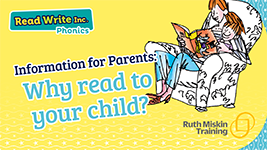 For READING and PHONICS, Key Stage 1 are currently using the schemes: Read Write, Inc., No Nonsense Spelling and the new curriculum.
For READING and PHONICS, Key Stage 1 are currently using the schemes: Read Write, Inc., No Nonsense Spelling and the new curriculum.
Please click here for information on how to support your child when practising the sounds found in Read Write Inc Phonics at home. You will find a series of information and tutorial videos explaining the basics of Read Write Inc. Phonics. If your child is learning to read with our programme, these videos will help you support them at home.
At Brighstone, we believe that the ability to read is fundamental to pupils’ development as independent learners, during their time at school and beyond. Reading is central to our ability to understand, interpret and communicate with each other and the world around us. Success in reading has a direct effect upon progress in all areas of the curriculum; therefore reading is given a high priority at Brighstone Primary School, enabling the children to become enthusiastic, independent and reflective readers across a wide range and types of literature, including different text types and genres, books, posters, magazines, signs and newspapers.
Our aims are for all children at Brighstone to:
- Become fluent, confident and expressive readers;
- Read with enjoyment across a range of genres;
- Read for pleasure as well as for information;
- Read and respond to a wide range of different types of literature;
- Understand the layout and how to use different genres and text types;
- Understand and apply their knowledge of phonics and spelling patterns and use this to decode words with accuracy;
- Build their bank of sight words to enable fluent reading;
- Have an interest in words and their meanings, developing a rich and varied vocabulary;
- Understand and respond to literature drawn from a range of cultures and literary heritage.
Reading at Brighstone Primary School is taught and celebrated in a range of ways. Some of these are generic across the whole school, whilst others are specific to key stages. These may be implemented by the class teacher or by the LSA, or voluntary readers such as parents and governors.
Reception and Key Stage 1
- Shared Reading, using a big book or text on the interactive whiteboard, with small groups or the whole class;
- Guided Reading of the same text in small groups, including teaching a range of reading strategies and comprehension;
- Frequent readers on a 1:1 basis, for those children who need to ‘catch-up’ with their peers/chronological age;
- Daily phonics lessons, using Read Write Inc. alongside the National Curriculum and planning documents from Hampshire;
- Daily spelling lessons in Year 2 following No Nonsense Spellings:
- Phonics intervention groups in each class where needed;
- Reading of texts linked to topic work;
- Story time in which the class teacher or LSA reads to the class;
- Library visits, including the school library and local village library;
- Visits from the local librarian;
- Children’s Book Week and World Book Day involving local authors, booksellers, poets, storytellers and a range of book related activities;
Extra activities to raise the profile of reading, linked to different themes, such as Riveting Reading Pyjama Evenings and Ride the Reading Roller Coaster.
Key Stage 2
- Shared Reading, including use of the interactive whiteboard;
- Guided Reading of the same text, in small groups;
- Weekly comprehension activities linked to the literacy theme/topic;
- Frequent readers on a 1:1 basis, for those children who need to ‘catch-up’ with their peers;
- Regular word level, spellings and phonics work, as a whole class or in small groups for those who need it;
- Reading intervention groups (including Nessy);
- Reading of texts linked to topic work;
- Reading for pleasure opportunities;
- Other comprehension activities;
- Story time in which the class teacher or LSA reads to the class;
- Visits from the local librarian;
- Children’s Book Week and World Book Day involving local authors, booksellers, poets, storytellers and a range of book related activities;
- Extra activities to raise the profile of reading, linked to different themes, such as Riveting Reading Pyjama Evenings and Ride the Reading Roller Coaster.
Why read to your child?
Parents and carers are strongly encouraged to be actively involved in their children’s reading at all ages, by listening to them read, reading to their children, and by promoting a home environment in which books are valued. Click on the picture to learn more about the value of reading to your child.
Parents are encouraged to write in their child’s reading record when they have heard them read, to support the communication between home and school. Parents and carers are invited in to read with children during Family Learning Afternoons at points throughout the year. Various reading incentive schemes are also planned to raise the profile of reading at home, and children and families are encouraged to take part in the local library Summer Reading Challenge every year, starting and finishing with visits from the local librarian
For further information, please see the termly newsletter detailing your child’s learning or the current (Draft) Reading Policy below.
Reading Policy Revised January 2018
